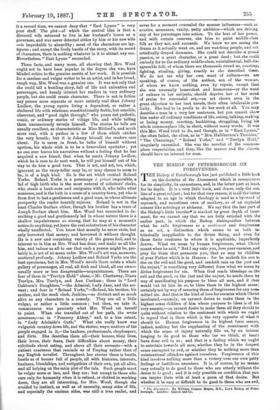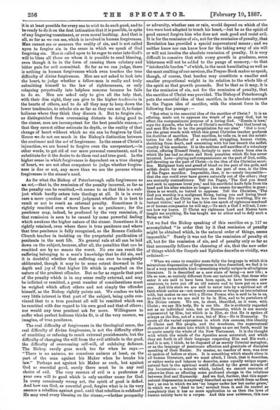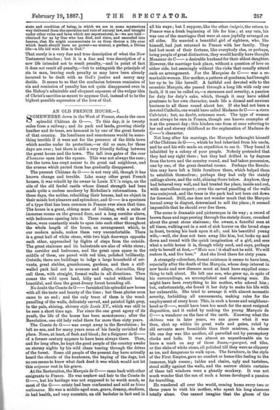THE BISHOP OF PETERBOROUGH ON FORGIVENESS.
(111HE Bishop of Peterborough has just published a little book on the doctrine of the Atonement which is conspicuous for its simplicity, its earnestness, and, in the latter part at least, for its depth. It is a very little book, and draws only the out- line of a great subject ; but for that very reason, it is all the better adapted to an age in which theology is used as a by-word of
reproach, and sometimes even of mockery, as of an exploded science like astrology or alchemy. We say that the last part of the Bishop's little treatise* is marked by great depth of treat- ment, for we cannot say that we are folly satisfied with the earlier part, in which the Bishop distinguishes between what he calls forgiveness as a sentiment and forgiveneee as an act, a distinction which seems to us both in- trinsically inapplicable to the divine Being, and even for those finite creatures to whom it is applicable, imperfectly drawn. What we mean by human forgiveness, what Christ meant when he said," But I say unto you, love your enemies, and pray for them that persecute yon, that ye may be children of your Father which is in Heaven : for he maketh his sun to rise on the evil and the good, and sendeth rain on the just and the unjust," is something very different from what we mean by divine forgiveness for sin. When God sends blessings on the evil and the good, on the just and the unjust, he sends them by way of manifesting his purpose to bless all men, and if they would but let him do so, to bless them in the highest sense; certainly not by way of assuring them of forgiveness for any cons. mitted sin. And that is the kind of love for enemies which Christ inculcated,—namely, an earnest desire to make them in the highest sense children of him whose purpose to bless is of his very essence,—an earnest desire to make them all they should be quite without relation to the sentiment with which we ought to regard that in them which is the very opposite of what it should be. Human forgiveness in its highest form means, indeed, nothing but the supplanting of the resentment with which the sense of injury naturally fills us, by an intense longing to do good to those who (as we think, at least) have done evil to us ; and that is a feeling which we ought to entertain towards all men, whether they be in the deepest sense corrupted by evil, or whether they be nothing more than unintentional offenders against ourselves. Forgiveness of this kind involves nothing more than a victory over our own petty feelings or fastidious aversions. It is, of course, by no newts easy actually to do good to those who are utterly without the desire to be good ; and it is only possible on condition that you can inspire them with at least a germ of that desire. But whether it be easy or difficult to do good to those who RTO evil, • The Atonement. By William Connor Magee, D.D., Lord Bishop of Peter- borough. London: Cassell and Co.
it is at least possible for every one to wish to do each good, and to be ready to do it on the first intimation that it is possible, in spite of any lingering resentment, or even moral loathing. And that is all, so far as we can see, which is involved in human forgiveness. Man cannot see or measure the reality of sin, and is not called upon to forgive sin in the sense in which we speak of God forgiving sin. Man is called upon to be eager to enter into God's will to bless all those on whom it is possible to send blessing, even though it be in the form of causing them salutary and bitter pain for evil committed. So far as we can judge, there is nothing in human forgiveness which even touches the true difficulty of divine forgiveness. Men are not asked to look into the heart, to judge whether a fellow-man is really and truly submitting himself to the law of righteousness, or only relapsing perpetually into helpless remorse because he fails to do so. Men are asked only to give all the help that, with their dim sight, they can give to the higher tendencies in the hearts of others, and to do all they may to keep down the lower tendencies, to rebuke sin so far as they can see it, to foster holiness where they think they discern it. But to forgive yin, as distinguished from overcoming distaste to doing good to the sinner, men are incompetent for the best possible reason,— that they cannot either estimate its depth, or the reality of that change of heart without which no sin can be forgiven by God. Hence we do not see much in the Bishop's distinction between the sentiment and the act of forgiveness. In the sense of Christ's injunction, we are bound to forgive even the unrepentant,—in other words, to get rid of our mere personal resentment, and to substitute for it the desire to do them real and true good. In the higher sense in which forgiveness is dependent on a true change of heart, we are not often competent to judge whether forgive- ness is due or not, any more than we are the persons whose forgiveness is the sinner's need.
As for what the Bishop of Peterborough calls forgiveness as an act,—that is, the remission of the penalty incurred, so far as the penalty can be remitted,—it seems to us that this is a sub- ject which hardly enters into theology at all. It is in every case a mere question of moral judgment whether it is best to remit or not to remit an external penalty. Sometimes it is rightly remitted even where there is no penitence; for the penitence may, indeed, be produced by the very remission, if that remission is seen to be caused by some powerful feeling which awakens the higher nature of the sinner. Sometimes it is rightly retained, even where there is true penitence and where that true penitence is fatly recognised, as the Roman Catholic Church teaches in insisting on the purgatorial purification of penitents in the next life. No general rule at all can be laid down on the subject, because, after all, the penalties that can be remitted are by no means the worst. No one can remit the suffering belonging to a man's knowledge that he did sin, and it is doubtful whether that suffering can ever be completely obliterated, though it may be to some extent drowned in the depth and joy of that higher life which is engrafted on the nature of the penitent offender. But so far as regards that part of the penalty which is in any sense really external, and may be inflicted or remitted, a great number of considerations must be weighed which affect others and not simply the offender himself, as the Bishop rightly points out. We confess we take very little interest in that part of the subject, being quite con- vinced that to a true penitent all will be remitted which can be remitted with due regard to his own good and that of others ; nor would any true penitent ask for more. Willingness to stiffer what perfect holiness thinks fit, is of the very essence, we imagine, of true penitence.
The real difficulty of forgiveness in the theological sense, the real difficulty of divine forgiveness, is not the difficulty either of remitting or refusing to remit external punishments, but the difficulty of changing the will from the evil attitude to the good, the difficulty of overcoming self-will, of subduing defiance. The Bishop surely goes much too far when he says :— "There is no animus, no conscious animus at least, on the part of the man against his Maker when he breaks his law." Perhaps not against his Maker as such, but against God as essential good, surely there must be in any real choice of evil. The very essence of evil is a preference of your own will to good which is only another name for God. In every consciously wrong act, the spirit of good is defied. And how can God, as essential good, forgive what is in its very essence a rebellion against good, until that rebellion is subdued? He may send every blessing on the siuner,—whether prosperity
or adversity, whether sun or rain, would depend on which of the two were best adapted to touch his heart,—bnt he as the spirit of good cannot forgive him who does not seek good and resist eviL It is for the remission of sin, not for the remission of penalty, that Revelation has provided a special supernatural means ; and we neither know nor can know how far the taking away of sin will or will not involve the absolute remission of penalty. It is very difficult to conceive that with every growth in goodness, some bitterness will not be added to the pangs of memory,—to that "intolerable burden " of which, in the most humiliating as well as the most exalting of our services, the Prayer-Book makes us speak, though, of course, that burden may constitute a smaller and smaller proportional weight in its relation to the whole life of the spirit as that growth proceeds. But be that as it may, it is for the remission of sin, not for the remission of penalty, that the sacrifice of Christ was provided. The Bishop of Peterborough puts the essential idea of that sacrifice, in its absolute contrast to the Pagan idea of sacrifice, with the utmost force in the following fine passage
"But what is the essential idea of the sacrifice of Christ P It is an offering, made not to appease the wrath of an angry God, but to effect the compassionate purpose of a loving God. Herein is love,' says the Apostle, who tells us of Christ's sacrifioe, 'that God loved us, and sent His Son to be the propitiation for our sins." God is love,' are the great words with which this great Christian teacher prefaces his doctrine of sacrifice. That sacrifice, he tells us, is not the substi- tution for the offender of a reluctant, straggling, human victim, shrinking from death, and execrating with his last breath the selfish cruelty of his murderer. It is the sublime self-sacrifice of a voluntary victim' offering Himself freely, lovingly to save others from sins in which He has had no share and from penalties which He has never incurred. Love—pitying and compassionate on the part of God, noble, self-devoting on the part of Christ—is the idea of the Christian sacri- fice. Malignant hate and greed of blood on the part of the gods, and selfush desire for self-preservation on the part of man, is the ides of the Pagan sacrifice. Impossible, then, it is—surely impossible— that the one could ever have grown naturally out of the other ; they are mutually contradictory. Tell the Pagan, The God you dread and seek to appease loves you,' and his sacrificial knife falls from his hand and his altar smokes no longer his reason for sacrifice is gone ; there is no wrath, no hatred to appease. Tell the Christian, The God yon worship is a malignant Being, hating you and loving blood and death, and the Christ you love has been His unwilling, His re- luctant victim,' and if he has in him one spark of righteous manhood or of human compassion he will say,—To such a God I will not, I can- not bow my knees. If Christ my righteous Lord and Master have taught me anything, He has taught me to abhor and to defy such a Being as this.'
Yet we find the Bishop speaking of this sacrifice on p. 117 as accomplished "in order that by it that remission of penalty might be obtained which, in the natural order of things, seems impossible." Surely it was not for the remission of penalty at all, but for the remission of sin, and of penalty only so far as that necessarily follows the cleansing of sin, that the new order of things which the Gospels and Epistles describe so vividly, was ordained:—
" When we come to consider more fully the language in which this miraculous dispensation of forgiveness is thus described, we find it to be of a very remarkable kind—something wholly unique in all religious literature. It is described as a new state of being—a new life ; a life so new, so entirely different from our natural life, that those who enter it are said to have been born again to have become new creatures, to have put off an old nature and to have put on a new one. And this state we are said to enter into by a spiritual act of faith which unites us—not merely connects or brings us into relations with, but makes us one with a Divine Person who is said to be in no, to dwell in us as we are said to be in Him' and to be partakers of His Divine nature. We are, in short, identified, as it were, with Christ ; we are His body, He is our life. He is evidently regarded not as an individual man, but as Humanity, which is not merely represented by Him, but which is in Him, so that He is spoken of always as the Son, not of a man, but of Man—He is Humanity. To quote all the varied expressions in which this oneness, this identity of Christ and His people, and the wondrous, the supernatural character of the state into which it brings us are set forth, would be to quote nearly the whole of the New Testament. It is the thought with which the minds of the Apostles seem saturated, and which they set forth in all their language respecting Him and His work ; and it is not, I think, to be disposed of as merely Oriental metaphor, or as the language of passionate affection and gratitude of disciples speaking of their Master. No master, no teacher of men, was ever so spoken of before or since. It is something which stands alone in all human literature, and we must admit, I think, that it describes, or rather seeks and labours to describe, some equally unique super- natural fact in the spiritual world effected by the great miracle of the Incarnation—a miracle which, indeed, we cannot conceive of otherwise than as effecting some profound change in the relations between God and Humanity. And we find, further, that this super- natural dispensation is expressly described as one which frees us from law ; as one in which we are 'no longer under law bat under grace,' in which we are dead to law,' severed from it and its control so completely that it has no more application to us than the laws of human society have to a corpse. And this new existence, this new
state and condition of being, in which we are in some mysterious way delivered from the operation and rule of natural law, and brought under other rules and laws which are supernatural, is—we are told— obtained for us by One who has died, and risen, and ascended into heaven, that He might communicate to us from thane° a life over which death should have no power—an eternal, a perfect, a Divine life—a life hid with Him in God."
That surely is a very fine and true description of what the New Testament teaches ; but it is a fine and true description of a new life intended not to remit penalty,—and in point of fact it does not remit all penalty,—bnt to extinguish the principle of sin in man, leaving such penalty as may have been already incurred to be dealt with as God's justice and mercy may decide. It seems to us that the confusion between remission of sin and remission of penalty has not quite disappeared even in the Bishop's admirable and eloquent exposure of the vulgar idea of Christ's sacrifice as meant to appease God, instead of to be the highest possible expression of the love of God.




































 Previous page
Previous page